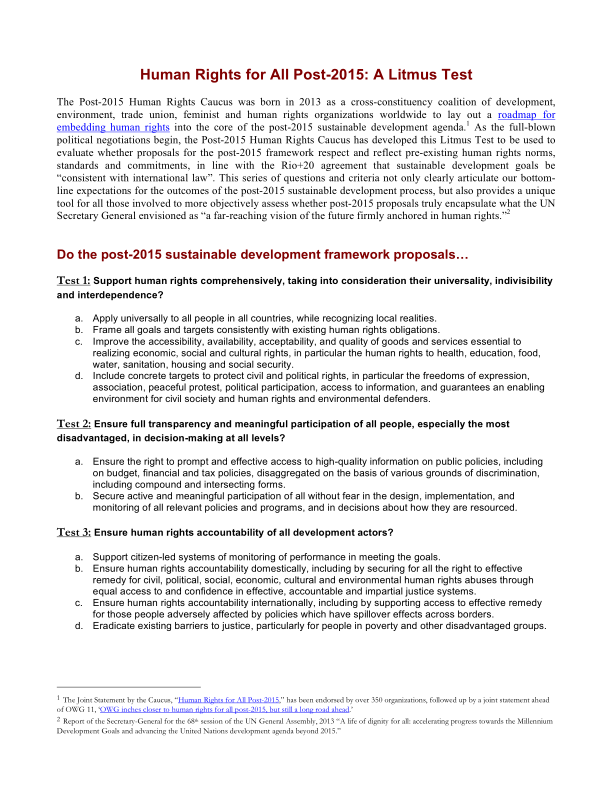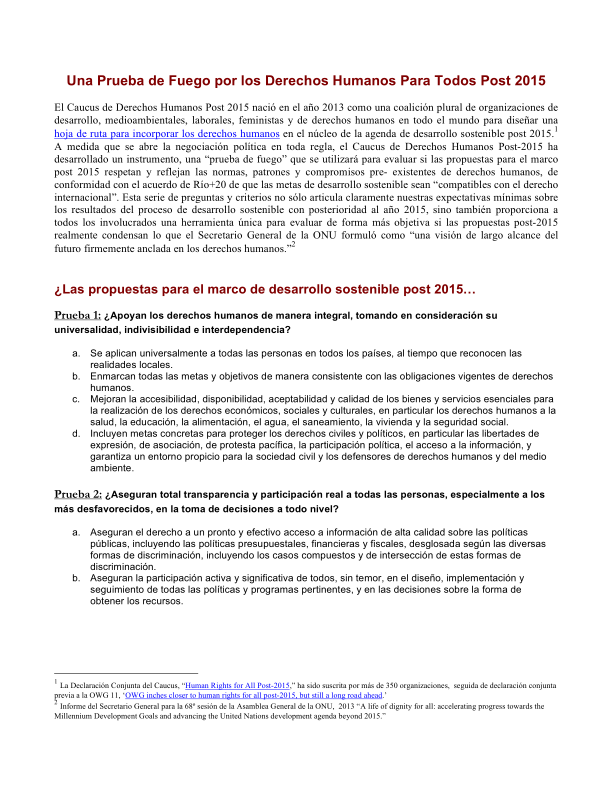a pdf of the Human Rights for All Post-2015 Litmus Test can be downloaded here
se puede descargar este documento en español aquí
Human Rights for All Post-2015: A Litmus Test, June 2014
The Post-2015 Human Rights Caucus was born in 2013 as a cross-constituency coalition of development, environment, trade union, feminist and human rights organizations worldwide to lay out a roadmap for embedding human rights into the core of the post-2015 sustainable development agenda. As the Open Working Group’s (OWG) efforts near completion and the full-blown political negotiations begin, the Post-2015 Human Rights Caucus has developed this Litmus Test to be used to evaluate whether proposals for the post-2015 framework respect and reflect pre-existing human rights norms, standards and commitments, in line with the Rio+20 agreement that sustainable development goals be “consistent with international law”. This series of questions and criteria not only clearly articulate our bottom-line expectations for the outcomes of the post-2015 sustainable development process, but also provides a unique tool for all those involved to more objectively assess whether post-2015 proposals truly encapsulate what the UN Secretary General envisioned as “a far-reaching vision of the future firmly anchored in human rights.”
Do the post-2015 sustainable development framework proposals…
Test 1: Support human rights comprehensively, taking into consideration their universality, indivisibility and interdependence?
(a) Apply universally to all people in all countries, while recognizing local realities.
(b) Frame all goals and targets consistently with existing human rights obligations.
(c) Improve the accessibility, availability, acceptability, and quality of goods and services essential to realizing economic, social and cultural rights, in particular the human rights to health, education, food, water, sanitation, housing and social security.
(d) Include concrete targets to protect civil and political rights, in particular the freedoms of expression, association, peaceful protest, political participation, access to information, and guarantees an enabling environment for civil society and human rights and environmental defenders.
Test 2: Ensure full transparency and meaningful participation of all people, especially the most disadvantaged, in decision-making at all levels?
(a) Ensure the right to prompt and effective access to high-quality information on public policies, including on budget, financial and tax policies, disaggregated on the basis of various grounds of discrimination, including compound and intersecting forms. (b) Secure active and meaningful participation of all without fear in the design, implementation, and monitoring of all relevant policies and programs, and in decisions about how they are resourced.
Test 3: Ensure human rights accountability of all development actors?
(a) Support citizen-led systems of monitoring of performance in meeting the goals. (b) Ensure human rights accountability domestically, including by securing for all the right to effective remedy for civil, political, social, economic, cultural and environmental human rights abuses through equal access to and confidence in effective, accountable and impartial justice systems. (c) Ensure human rights accountability internationally, including by supporting access to effective remedy for those people adversely affected by policies which have spillover effects across borders. (d) Eradicate existing barriers to justice, particularly for people in poverty and other disadvantaged groups.
Test 4: Guarantee that the private sector respects human rights?
(a) Promote effective legislative and regulatory measures to guarantee in practice that all companies act in line with international human rights law and the UN Guiding Principles on Business and Human Rights. (b) Introduce mandatory, independent assessments and periodic public reporting of the human rights and sustainable development impacts of large businesses.
Test 5: Combat inequality and end discrimination in all its forms?
(a) Guarantee timely collection of disaggregated data on the basis of the most nationally-relevant grounds of disparity and discrimination, taking into account compound and intersecting discrimination. (b) Ensure that any non-zero or non-universal sectoral commitments are complemented by time-bound targets to progressively eliminate inequalities between groups by prioritizing a more ambitious rate of progress for those most disadvantaged groups. (c) Combat economic inequality within and between countries. (d) Protect decent work and fundamental worker's rights for all, reducing unfair income disparities. (e) Seek to eradicate cross-border tax evasion, return stolen assets, forgive odious debt and progressively combat tax abuses as critical instruments to reduce inequality between countries.
Test 6: Specifically and comprehensively support girls’ and women’s rights?
(a) Ensure all individuals meaningful access, including financial access, to acceptable, available, and quality sexual and reproductive health information and services and full sexual and reproductive autonomy. (b) Prevent, investigates and punishes all forms of gender-based violence, including harmful traditional practices. (c) Increase the share of women’s control over land, property, productive and natural resources, their economic independence, access to labor market and political participation. (d) Reduce the burden of unpaid care work. (e) Eliminate the multiple and intersecting forms of discrimination women and girls face, and entails a series of positive measures to overcome structural discrimination and ensure substantive enjoyment of equality. (f) Ensure that gender equality and girls’ and women’s rights are mainstreamed throughout all goals, including by developing gender-sensitive targets under other goals.
Test 7: Secure a minimum floor of socioeconomic well-being for all?
(a) Embrace a universal or zero target approach for all minimum core economic and social rights obligations, such as nutritionally adequate and safe food to ensure all people’s freedom from hunger, free primary education, essential primary healthcare, and a basic essential level of safe water. (b) Guarantee a quality social protection floor for all, in line with human rights and ILO recommendation 202.
Test 8: Ensure that any global partnerships for sustainable development are aligned with human rights?
(a) Ensure human rights-guided policy coherence, with governments and international financial institutions mandated to conduct independent and periodic public assessments of the human rights and sustainable development cross-border impacts of their policies and agreements, particularly those related to trade, investment, aid, tax, migration, intellectual property, debt, monetary policies and financial regulation. (b) Include clear, time-bound commitments for all actors in development, including high-income countries, international institutions and large businesses. (c) Develop a robust, multi-faceted global monitoring and accountability framework which tracks the compliance and accountability of all development actors to their commitments, including high-income countries, international institutions and large businesses, with full civil society participation and in constructive interaction with the human rights protection regime.
Signatories:
1. African Sky, The Netherlands
2. Anthropology Watch, Philippines
3. Article 19, Global Campaign for Free Expression and Information, UK
4. APVV UNION, India
5. Association of NGOs of Aotearoa, New Zealand
6. Avocats Sans Frontières, Belgium
7. Blue Veins, Pakistan
8. Bond, United Kingdom
9. Burundi Child Rights Coalition, Burundi
10. Centre For Human Rights And Climate Change Research, Nigeria
11. Centre for Democracy and Development, Nigeria
12. Center for Economic and Social Rights, International
13. Centre for Human Rights Studies, University of Surabaya, Indonesia
14. Committee to Protect Journalists, USA
15. Center for Reproductive Rights, International
16. Center for Women in Governance (CEWIGO), Uganda
17. Child Rights International Network, UK
18. CIVICUS, South Africa
19. Civil society organization network for development (RESOCIDE), Burkina Faso
20. Coalition for Democracy and Civil Society, Kyrgyzstan
21. CONADEC, DRC
22. CONCORD Sweden
23. Concertation Nationale de la Société Civile du Togo (CNSC Togo), Togo
24. Cosader Cameroun, Cameroon
25. Democracy Monitor, Azerbaijan
26. Ebony Youth and Orphans Support Initiative Kenya, Kenya
27. Egyptian Center for Economic and Social Rights, Egypt
28. Egyptian Initiative for Personal Rights, Egypt
29. Equidad de Genero: Ciudadania, Trabajo y Familia, Mexico
30. European Environmental Bureau, Belgium
31. Feminist Task Force, International
32. Femlink Pacific, Fiji
33. FEMNET (African Women's Development & Communication Network), Kenya
34. FODEP, Zambia
35. Forum Human Rights Germany, Germany
36. Forum for Women in Democracy (FOWODE), Uganda
37. Foundation for Human Rights Initiative (FHRI), Uganda
38. Four Freedoms Forum, USA
39. Freedom Forum, Nepal
40. Front Line Defenders, Ireland
41. Fundación CONSTRUIR, Bolivia
42. Gender and Development Advocates (GANDA), Philippines
43. Gesr Centre for Development, Sudan
44. Global Call to Action Against Poverty - Philippines
45. Global Initiative for Economic, Social and Cultural Rights, USA/Switzerland
46. Global Partnership[ for Local Action (GP4LA), Austria
47. Global Partnership for the Prevention of Armed Conflict, International
48. Good Shepherd International Justice Peace Office, USA
49. Grey Panthers, USA
50. Habitat International Coalition (HIC), Egypt
51. Hawai'i Institute for Human Rights, USA
52. Human Dignity, France
53. Human Rights Watch Kenya
54. IBON International, Philippines
55. International-Lawyers, Switzerland/International
56. Ipas, International
57. Isis-Women's International Cross Cultural Exchange (Isis-WICCE), Uganda
58. Jahon, Tajikistan
59. Kepa ry, Finland
60. Labour,Health and Human Rights Development Centre, Nigeria
61. Law Life Culture, Bangladesh
62. Legal Aid of Cambodia, Cambodia
63. Legal Service for Human Rights Commission, India
64. Ligue des Droits de la personne dans la region des Grands Lacs (LDGL), Rwanda, Burundi and DR Congo
65. Light for the World, international
66. Maison de la Societe Cvile (MdSC), Benin
67. Masculinity Institute – MAIN, Kenya
68. Minority Rights Group International, UK, Uganda, Hungary
69. Nansen Dialogue Centre Serbia, Serbia
70. National Association of Professional Environmentalists (NAPE), Uganda
71. National Fisheries Solidarity Movement, Sri Lanka
72. NDC Montenegro, Montenegro
73. NGO Federation of Nepal, Nepal
74. North-West University, South Africa
75. Oceania Human Rights, USA
76. Odhikar, Bangladesh
77. Oman Group for Human Rights, Oman
78. Pakistan NGOs Forum, Pakistan
79. PDHRE, People's Movement for Human Rights Learning, USA
80. Peace Movement Aotearoa, New Zealand
81. Philippine Rural Reconstruction Movement, Philippines
82. Plataforma de ONG de Accion Social, Spain
83. Population Matters, UK
84. Rainbow Genders Society, Malaysia
85. Reseau Des Associations Et Groupements Des Femmes Handicapées Du Tchad (RAGFHT), Chad
86. RESURJ, International
87. Right Defenders Pakistan, Pakistan
88. Sanayee Development Organization, Afghanistan
89. SERR, United States
90. SIGLO XXIII, El Salvador
91. SocialTIC A.C., Mexico
92. Socio-Economic Rights Institute of South Africa (SERI), South Africa
93. Social Watch, Uruguay
94. Society of Catholic Medical Missionaries, Intenational
95. Solidar, Belgium
96. Solidarite Des Femmes Burundaises Pour Lutter Contre Le Sida Et Le Paludisme Au Burundi, Burundi
97. South Sudan Society for Democracy in Action, South Sudan
98. Stand Up For Your Rights, The Netherlands
99. Sudan Democracy First Group (SDFG), Uganda
100. Terre Des Jeunes Du Burundi, Burundi
101. Thai Committee for Refugees Foundation (TCR), Thailand
102. Think Centre, Singapore
103. Treatment Advocacy and Literacy Campaign (TALC), Zambia
104. Twerwaneho Listeners Club, Uganda
105. Uganda National NGO Forum, Uganda
106. Unanima International, USA
107. Union de Jeunes pour la Paix et le Développement, Burundi
108. Union Of Palestinian Women's Committees, Palestine
109. United Methodist Church--General Board of Church and Society, US/International
110. Unitarian Universalist Congregation, USA
111. University of Antwerp, Research Group on Law and Development, Belgium
112. Wash United
113. West Africa Network for Peacebuilding in Côte d'Ivoire (WANEP-CI), Ivory Coast
114. Women's Advocacy and Communication Network (WANET), Cameroon
115. Women’s International League for Peace and Freedom
116. Voluntary Action Network India, India
117. Young Women's Leadership Institute, Kenya
118. Zi Teng, Hong Kong

